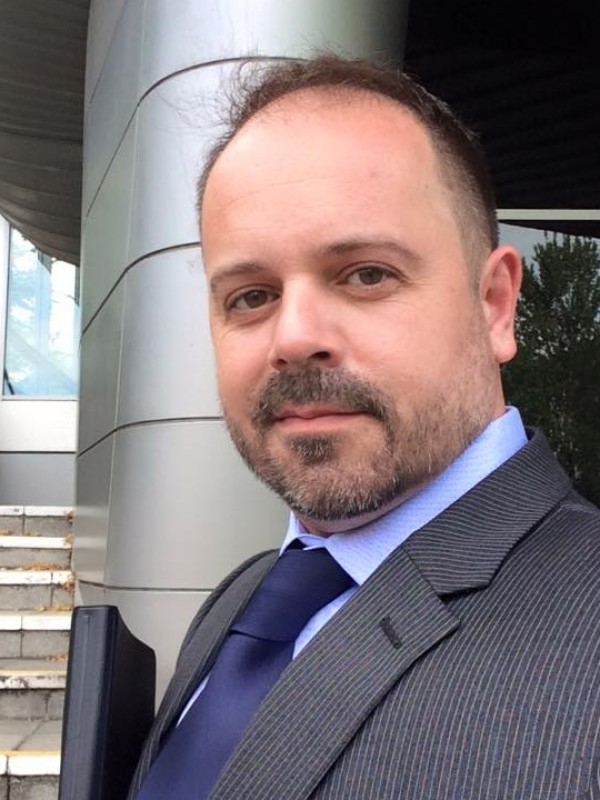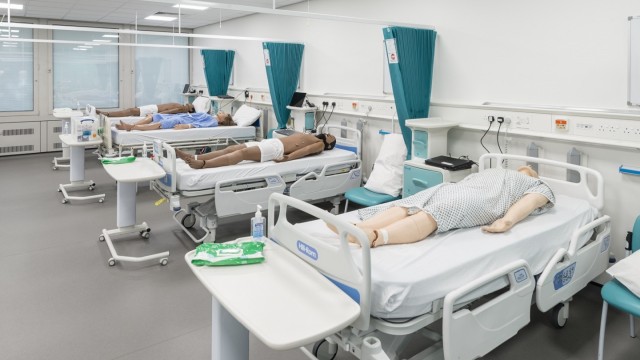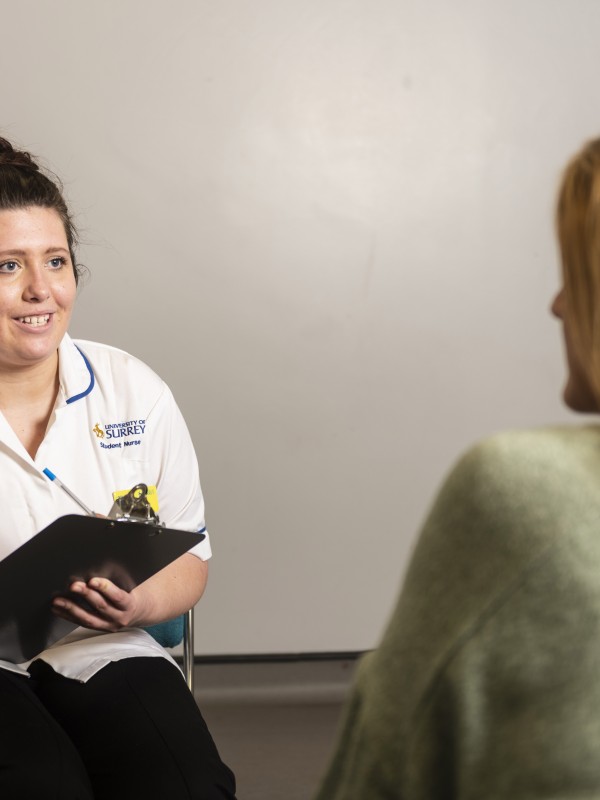
- Advanced Clinical Practice
MSc — 2025 entry Advanced Clinical Practice
On our Advanced Clinical Practice MSc, you’ll learn how to take on more responsibility as a practitioner, enhance the capabilities of healthcare teams and work towards the constant improvement of patient care.
Why choose
this course?
- Learn from a multidisciplinary team of lecturers, who are all healthcare professionals with experience of working in the NHS.
- Access our Clinical Simulation Centre to practise scenarios with lifelike manikins and actors.
- Get the academic requirements needed to meet the standards to become eligible to join the National Directory of Advanced Clinical Practitioners.
- Complete modules which will enable you to register with the Nursing and Midwifery Council (NMC) or the Health and Care Professions Council (HCPC) to prescribe any medicine within national and local guidelines.
Statistics
100%
Of graduates from our School of Health Sciences are in employment or further study (Graduate Outcomes 2024, HESA)
92%
The School of Health Sciences received an overall satisfaction score of 92% in the Postgraduate Taught Experience Survey 2023
9th in the UK
Surrey is ranked 9th in the UK for overall student satisfaction in the Postgraduate Taught Experience Survey 2023
Accreditation
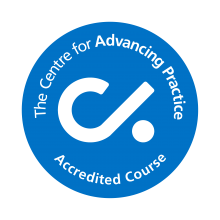
What you will study
You’ll evolve your leadership skills and your knowledge of contemporary policy, healthcare and the theoretical perspectives on clinical practice. You’ll also develop the ability to tackle complex issues and use your initiative, applying your judgement to important clinical decisions when complete data is absent. You’ll explore and analyse key leadership issues in health and social care, while challenging and debating contemporary theory and practice.
Depending upon your clinical profession*, you may be able to study our V300 independent and supplementary prescribing module to improve patients’ access to appropriate medication. On this module, you’ll gain the skills and knowledge to prescribe safely and appropriately within your area of practice, and in line with current non-medical independent and supplementary prescribing legislation.
*Legally, not all clinical professions are currently able to prescribe so there will be a small number that cannot study the V300 module.
You’ll consider and critically evaluate links between theory and practice, exploring strategies relevant to the facilitation and assessment of learning within the workplace.
Professional recognition
MSc - Health Education England
This programme is accredited by the Centre of Advancing Practice.
Health Education England's Centre for Advancing Practice has been established to standardise post-registration education by accrediting advanced practice courses that achieve the standards outlined in the multi-professional Advanced Practice Framework.
Practitioners who have completed accredited education programmes will be eligible to be listed on the Centre's Advanced Practice Directory.
Programme accreditation from the Centre for Advancing Practice will bring a new level of consistency to the workforce and help showcase advanced practice within health and social care.
Research groups
You will be able to join one of our research groups, where you’ll participate in discussions about research topics, findings and publications, and you’ll benefit from our links with renowned research institutions across the world. We also have a host of external speakers that visit us and present their work, and a collection of seminars and workshops, allowing you to network with like-minded individuals.
This part-time course provides flexibility to complete modules, allowing you to fit your study around existing commitments.
Course length
This course can take between 2-5 years to complete. This is dependent on how many modules you select to study at a given time.
The structure of our programmes follows clear educational aims that are tailored to each programme. These are all outlined in the programme specifications which include further details such as the learning outcomes:
Please be aware: the course content and modules listed for this course are subject to change for the 2024/25 academic year, whilst we undertake a curriculum design review. Please contact the programme leader if you have any queries about the course.
Modules
Modules listed are indicative, reflecting the information available at the time of publication. Modules are subject to teaching availability, student demand and/or class size caps.
The University operates a credit framework for all taught programmes based on a 15-credit tariff, meaning all modules are comprised of multiples of 15 credits, up to a maximum of 120 credits.
Course options
Unstructured years
Semester 1
Core
This module is designed to meet the needs of professionals working in health & social care. The module is designed to support health care professionals who undertake an educational role to apply learning and teaching theory to their practice role. The module forms part of the teaching for professional practice programme and The Practice Teacher qualification.
View full module detailsThis module is designed to meet the needs of professionals working in health and social care who are interested in introducing change within their practice environment. The module will explore the current healthcare agenda, examining the need for change to meet the contemporaneous needs of the population. Students are encouraged to reflect upon how innovative practice could transform service delivery to improve experience quality, relative to their own area of practice.
View full module detailsThe module provides the students with a comprehensive understanding of how people learn in a learning environment with an emphasis on what constitutes an effective learning setting and how this is conducive for learning. Through a series of lectures and facilitated groupwork students will identify educational strategies that can be used to ensure that the student learning journey is meaningful. These concepts will be underpinned by learning theories which will help the students construct an understanding of how people learn in their own environments.
View full module detailsThis module enables students to apply a consultation process for the individual and the develop a patient centred management plan. Students will be equipped to undertake a health assessment of the patient/client across the body systems to identify a patient’s health care needs, complete a structured assessment, confidently recognise normal vs abnormal parameters for the individual, and use their findings to develop differential diagnoses.
View full module detailsSemester 2
Core
The module provides opportunities for participants to develop and demonstrate advanced practice knowledge, clinical reasoning and assessment skills. This includes analysis of information acquired from holistic advanced assessments, including the physical, social and psychological domains of health, and analysis of clinical investigations to inform care decisions. Participants are empowered to participate in multi-professional dialogue, learning and working to support advancing their practice. This is achieved as module participants come from a range of healthcare professions, from across the life span. Workplace based learning, supervision and assessments will provide advanced practice developmental opportunities within the participant’s clinical practice area.
View full module detailsThis module expands on student learning from the Leading People in Health and Social Care module, elevating thinking to an organisational and strategic level. Students will be empowered to explore the complexity of the internal and external organisational environments, valuing openness, collaboration, and the need for continuous organisational learning. Students will be enabled to recognise and analyse the factors that are key to strategic planning and successfully fulfilling organisational aims and purpose.
View full module detailsThis module provides students with a fundamental understanding of the core principles of engaging, supporting and leading people. Students will be empowered to support or create workplaces where staff thrive and collaborate, enabling patients and users of health and social care services to feel safe and supported. Exploring the concepts of care, compassion, courage, and vulnerability, to develop skills in enhancing relationships and creating safe environments.
View full module detailsSemester 1 & 2
Core
The module enables students to understand the theoretical and practical aspects of research; how to design research informed by theoretical, methodological and practical issues; and how to prepare a research proposal relevant to health and social care practice. The module provides students with the knowledge, skills and confidence in planning and writing a research proposal that can be taken forward to the dissertation module.
View full module detailsThis module will explore the role of decision making within the healthcare environment. It will support students' exploration of their understanding and knowledge of the theory underpinning decision making, judgement and human factors within healthcare, and the potential influential factors including; policy, risk, finances, ethics, the environment, shared decision-making, and the actual and potential consequences of the decision.
View full module detailsThis module aims to enable healthcare practitioners working in specialist and/or advanced roles to significantly expand their knowledge of pharmacology, related clinical sciences and the practice of medicines optimisation.
View full module detailsThe independent and supplementary prescribing V300 module provides an exciting and challenging opportunity for nurses, midwives, paramedics, physiotherapists, therapeutic and diagnostic radiographers, dietitians and podiatrists to support and improve clinical outcomes for patients. This module is designed to provide these health care professionals (HCPs) with the knowledge and skills to prescribe safely and appropriately within their area of practice and current non-medical, independent and supplementary prescribing legislation. The independent and supplementary prescriber may prescribe any medicine, within law and national & local guidelines for any condition within the practitioner’s area of expertise and competence. Currently, dietitians and diagnostic radiographers can practice as supplementary prescribers only. Successful completion of the module will empower these HCPs to improve access to appropriate medication in a timely manner, in line with the NHS Five Year Forward View (NHS England, 2017) & NHS Long Term Plan (NHS England, 2019) It will facilitate inter-professional working, maximising the benefits for patients and support for healthcare services identified in the Multi-professional framework for advanced clinical practice in England (NHS England, NHS Improvement, Health Education England, 2017). On successful completion of all aspects of the module, the University will inform the regulatory body that the student is eligible to register their qualification, the qualification will need to be registered within the timeframes specified by the regulatory body (NMC/HCPC). The module assessments must be successfully completed within two years of starting the module. The length of the module will be a minimum of 26 taught days over the academic semesters, with an additional 12 days of supervised learning in practice and all registrants must undertake both independent and supplementary elements of the module.
View full module detailsAcross academic years
Core
The dissertation module supports students to plan, undertake and report on a substantial original project that is relevant to their professional practice and their workplace organisations. Students will choose a topic area of their interest and will be supported throughout the project by a named supervisor. The project will involve developing a relevant research question and outlining the relevant policy context, carrying out a literature review, developing a robust methodology, collecting/identifying and analysing/synthesizing data, and to critically discuss the relevance of the findings to practice and current knowledge. Students will gain confidence in understanding and applying the research process. The students will have the opportunity to develop skills in research leadership, critical thinking, and writing, translating knowledge into practice, literature reviewing and digital knowledge.
View full module detailsThis module enables students to apply a consultation process for the individual and the develop a patient centred management plan. Students will be equipped to undertake a health assessment of the patient/client across the body systems to identify a patient’s health care needs, complete a structured assessment, confidently recognise normal vs abnormal parameters for the individual, and use their findings to develop differential diagnoses.
View full module detailsOptional modules for Unstructured (2-5 years) - FHEQ Levels 6 and 7
For further information regarding programme structure and module selection, please refer to the course catalogue.
Teaching and learning
You’ll learn from a multidisciplinary team of lecturers who are all healthcare professionals with experience of working in the NHS. You’ll also be taught by guest lecturers, including local doctors, nurses, midwives and other healthcare workers.
- Group work
- Lectures
- Online learning
- Simulation learning
- Role play
- Seminars
- Tutorials
- Independent study
Assessment
We use a variety of methods to assess you, including case studies, examinations, presentations, simulated learning experiences (objective structured clinical examinations – OSCEs) and written work.
Check individual module information to see full details at a module level.
General course information
Contact hours
Contact hours can vary across our modules. Full details of the contact hours for each module are available from the University of Surrey's module catalogue. See the modules section for more information.
Timetable
Course timetables are normally available one month before the start of the semester.
New students will receive their personalised timetable in Welcome Week, and in subsequent semesters, two weeks prior to the start of semester.
Please note that while we make every effort to ensure that timetables are as student-friendly as possible, scheduled teaching can take place on any day of the week (Monday – Friday). Wednesday afternoons are normally reserved for sports and cultural activities. Part-time classes are normally scheduled on one or two days per week, details of which can be obtained from Academic Administration.
Location
Our Medicine (Graduate Entry) BMBS degree, nursing and midwifery, and health science courses are taught at the Kate Granger Building (30 Priestley Road), on the Surrey Research Park.
Some modules on this course will be taught on Stag Hill campus.
We offer careers information, advice and guidance to all students whilst studying with us, which is extended to our alumni for three years after leaving the University.
We’ll prepare you to take the next step in your career, transforming you into an advanced practitioner with enhanced self-direction and excellent problem-solving abilities, preparing you for advanced practice roles in modern healthcare.
100 per cent of our health sciences graduates go on to employment or further study (Graduate Outcomes 2024, HESA). Our alumni typically take on more senior roles within the NHS or in private healthcare.
Visit the NHS careers website for further information.
You’ll benefit from our multimillion-pound facilities, home to our Clinical Simulation Centre that includes two wards, a Critical Care Unit and a Community Flat. Our Immersive Learning Environment, lifelike manikins and actors will transport you to the centre of hospital wards, so you can practise your skills in scenarios you may face in practice.
You’ll also get exclusive access to our Independent Clinical Learning Space, set up each week with the necessary equipment required to practise the techniques you’ll be learning.

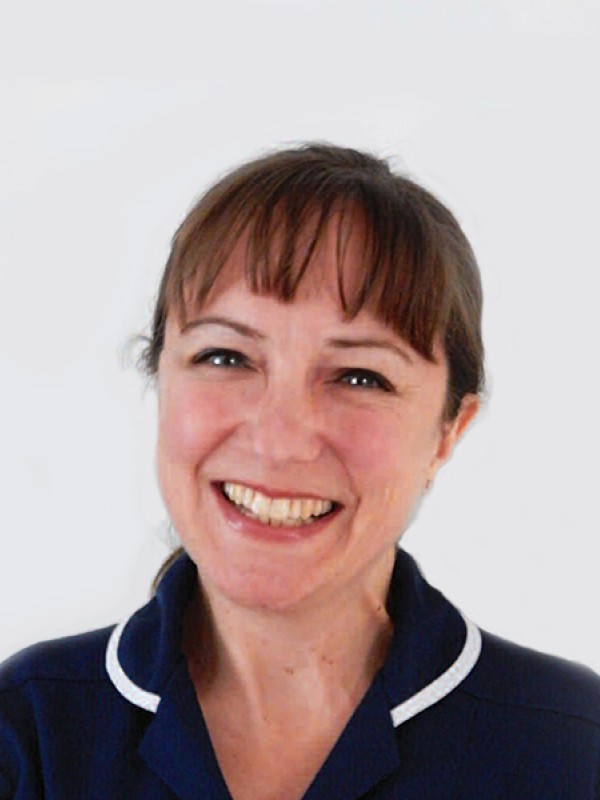
Annabel Sturges
Student - Advanced Clinical Practice MSc
"I previously completed an independent/supplementary prescribing (V300) module at Surrey, so knew first-hand that the teaching was excellent. The course is also well known within my trust, which is connected to Surrey."
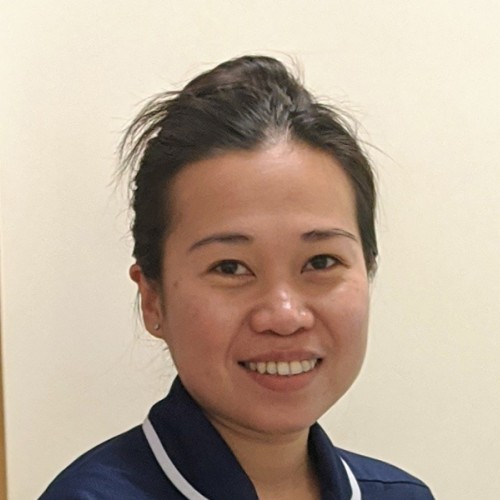
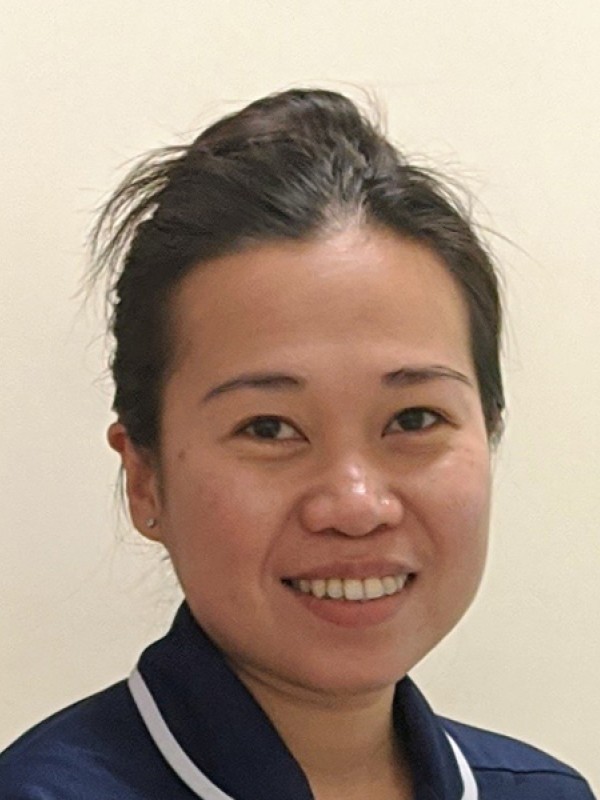
Susan Gayle Celera
Student - Advanced Clinical Practice MSc
"My time at Surrey has made me a more confident and competent nurse. I can now prescribe medications to patients, which is incredibly empowering, as other nurses now come to me instead of junior doctors."
UK qualifications
- A minimum of a 2:2 in a relevant UK honours degree, or a recognised equivalent international qualification.
- For information on entry requirements based on International Qualifications, please contact the admissions team with details about where you studied and the content of your qualification.
- You must be currently registered as a healthcare professional with the NMC, HCPC or GPhC to apply. GPhC applicants must have completed the Independent/Supplementary Prescribing module to RPL to the programme.
- At minimum applicants will have been qualified and practicing for a minimum of three years, with evidence of development. Those seeking external funding, for example from NHS England, should be aware of the funding body requirements.
- You will be employed for a minimum of 25 hours in an appropriate substantive role where there is a workforce need within UK healthcare and where the scope of practice can be developed to achieve programme outcomes with relevant experience. Less than full time roles will be reviewed on an individual basis to evaluate opportunities to engage in the required programme development and supervision. Those seeking external funding should be aware of funders requirements. Students must remain in appropriate employment for the duration of the programme.
Employers reference
- A satisfactory employer’s reference confirming your suitability and their agreement to support your development throughout the programme is required. Please download the Employer Reference document (PDF)
Declaration of support
- Appropriate advanced practice supervision must be in place for the duration of the programme this will be further confirmed and evaluated through the completion and return of our Coordinating Education Supervisor Declaration of Support template (docx).
English language requirements
IELTS Academic: 7.0 overall with 6.5 in each element.
These are the English language qualifications and levels that we can accept.
If you do not currently meet the level required for your programme, we offer intensive pre-sessional English language courses, designed to take you to the level of English ability and skill required for your studies here.
Selection process
Applications are screened for standard documentation and then referred to the programme lead for review and interview (telephone or face to face).
International students travelling to the UK
Due to the module structure of this programme, we are unable to provide sponsorship on the Student Route. International students should make use of the Visitor Visa Route to attend the practical component of the programme. Further details can be found on our apply for a visa page.
Unfortunately, the University cannot guarantee that Visitor Visa applications will be successful, and a refusal may result in students being unable to successfully complete the programme.
Scholarships and bursaries
Discover what scholarships and bursaries are available to support your studies.
Fees
The majority of students on this course will be funded through sponsorship arrangements with their NHS trust employer.
If you would be self-funding, please contact postreg_admin@surrey.ac.uk for information regarding the fees.
Additional costs
Travelling expenses such as those incurred for travelling between their clinical practice area and the University.
General programme related costs such as study materials. Potential costs involved in working/studying remotely e.g. internet connection etc.
The Independent and Supplementary prescribing module (V300) requires current DBS status check so this may incur costs.
Apply online
To apply online first select the course you'd like to apply for then log in.
Select your course
Choose the course option you wish to apply for.
Sign in
Create an account and sign into our application portal.
Please note that we may have to close applications before the stated deadline if we receive a high volume of suitable applications. We advise you to submit your application as soon as it is ready.
ApplyAdmissions information
Once you apply, you can expect to hear back from us within 14 days. This might be with a decision on your application or with a request for further information.
Our code of practice for postgraduate admissions policy explains how the Admissions team considers applications and admits students. Read our postgraduate applicant guidance for more information on applying.
About the University of Surrey
Need more information?
Contact our Admissions team or talk to a current University of Surrey student online.
Terms and conditions
When you accept an offer to study at the University of Surrey, you are agreeing to follow our policies and procedures, student regulations, and terms and conditions.
We provide these terms and conditions in two stages:
- First when we make an offer.
- Second when students accept their offer and register to study with us (registration terms and conditions will vary depending on your course and academic year).
View our generic registration terms and conditions (PDF) for the 2024/25 academic year, as a guide on what to expect.
Disclaimer
This online prospectus has been published in advance of the academic year to which it applies.
Whilst we have done everything possible to ensure this information is accurate, some changes may happen between publishing and the start of the course.
It is important to check this website for any updates before you apply for a course with us. Read our full disclaimer.


